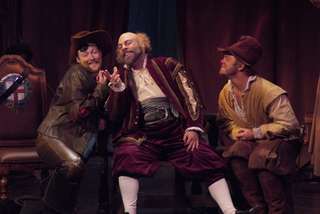|
Back
Capobianco’s Magical Falstaff Philadelphia
Helen Corning Warden Theater
11/13/2009 - and 17, 19 (Philadelphia), 21 (Warrington), 23 (Haverford), 25 November 2009
Giuseppe Verdi: Falstaff
Zach Nelson (Falstaff), Christopher Bolduc (Ford), Michelle Johnson (Alice Ford), Corinne Schaefer (Nannetta), Cynthia Cook (Meg Page), Margaret Mezzacappa (Quickly), Taylor Stayton (Fenton), Noah Van Niel (Dott. Caius), Sean Arnold (Bardolfo), Nicholas Masters (Pistola)
Christofer Macatsoris (conductor)
Tito Capobianco (stage director), Peter Harrison (set designer), Val Starr (Costume designer), Allen G. Doak, Jr. (lighting designer)

N. Masters, Z. Nelson, S. Arnold (© Paul Sirochman)
Tito Capobianco launched his American career as stage director in residence at the Academy of Vocal Arts. Almost 50 years later, Capobianco is returning to Philadelphia to produce a sparkling Falstaff. Capobianco lays bare the vital fun and joyous energy in Verdi’s masterpiece but he also brings out the deep humanity as well. The director hones his talented cast into a virtuoso ensemble. This Falstaff unfolds joyously but seamlessly against Peter Harrison’s spare Elizabethan set. Val Starr’s period costumes add to the visual appeal. Conductor Christofer Macatsoris matches Capobianco’s concept with a musical performance that sweeps along vibrantly and tautly. Macatsoris catches the rhythmic spring in Verdi’s music but he also highlights the instrumental detail in the miraculous score. This Falstaff explodes with vital energy in the pit as well as on the stage of the Helen Corning Warden Theater.
AVA’s young artists sing as expertly as they portray the characters. Verdi’s music makes demands that only mature singers can meet. Amazingly, the youthful cast delivers. At the center of the performance is Zach Nelson’s Falstaff. In his first year at the Academy, Nelson sings and acts with surprising maturity. Yes, his voice may lack ideal tonal amplitude and may thin out in its lower reaches, but he savors – and delivers with clarity and wit – Arrigo Boito’s words and sings Verdi’s music with remarkable polish. Baritone Christopher Bolduc (Ford) shares Nelson’s vocal limitations – his light but attractive voice does not project in its lower reaches – but he sings and acts with nuanced authority. Bolduc turns Ford’s aria into a tour de force and, in the process, earns an ovation. Despite an unflattering costume of garish colors decked with feathers – Starr’s only miscalculation – Bolduc gives a master class in interpretive artistry in Ford’s second-act scene with Falstaff. Rounding out the male principals, Taylor Stayton offers a sweetly sung and eagerly acted Fenton.
Leading the women in the cast, Michelle B. Johnson (Alice Ford) and Margaret Mezzacappa (Mrs. Quickly) light up the stage with their vivid acting and fill the air with their richly expressive singing. Johnson’s luscious soprano soars through Alice’s quicksilver vocal lines. Mezzacappa’s rich-toned Quickly sounds powerful and vibrant. Verdi gives Meg Page few chances to emerge from the ensemble, but Cynthia Cook leaves an attractive imprint on the role. Corinne Schaefer sings Nannetta’s Fairy Song appealingly and joins in the comic fun with gusto.
The cast of this winning Falstaff has no weak link. Noah Van Niel makes a capital Dr Caius. Looking younger than most, he brings energy and intensity to the role. His ringing, focused tenor sounds impressive. Rounding out the big cast are Sean Arnold (Bardolfo) and Nicholas Masters (Pistola). Capobianco challenges both to fashion contrasting characters. They sing smartly. Capobianco unfolds the complicated ensembles with remarkable precision and choreographs the movement vividly. There is no room for a chorus on the small stage, so the final act’s tongue-twisting ensemble “Pizzica, pizzica, pizzica, stuzzica” is cut. That hardly mars a production filled with joyous energy.
Robert Baxter
|